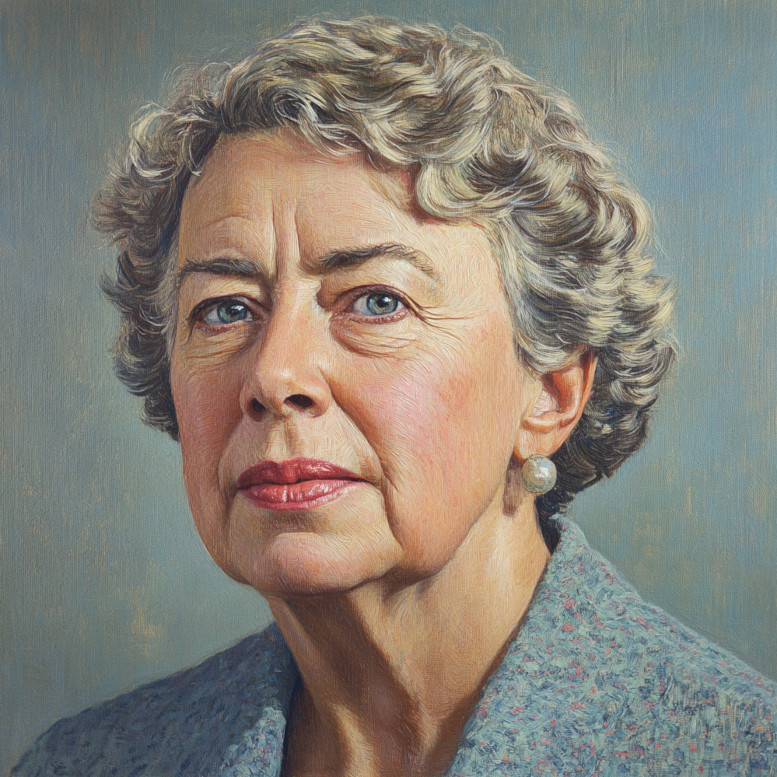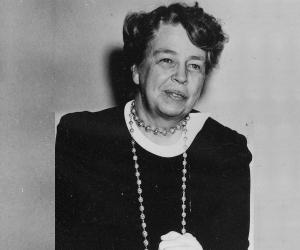Former First Lady of the United States

Eleanor Roosevelt (1884–1962) was an American political figure, diplomat, and activist who served as First Lady of the United States from 1933 to 1945 during her husband Franklin D. Roosevelt’s four terms in office. She redefined the role of the First Lady, using her position to advocate for human rights, social justice, and women’s issues. After her tenure as First Lady, she became a key figure in the founding of the United Nations and played a crucial role in drafting the Universal Declaration of Human Rights. Eleanor Roosevelt remains one of the most influential women in American history.
Early Life and Background
Birth and Family: Anna Eleanor Roosevelt was born on October 11, 1884, in New York City into a prominent family. She was the niece of President Theodore Roosevelt, and her father, Elliott Roosevelt, was Theodore's younger brother. Her mother, Anna Hall Roosevelt, came from a wealthy and socially prominent family. Despite her privileged upbringing, Eleanor’s early life was marked by personal tragedies. Her mother died when she was eight years old, and her father died two years later. After their deaths, Eleanor was raised by her maternal grandmother in a strict household.
Education: Eleanor was educated privately at home until she was sent to Allenswood Academy, a boarding school in England, at the age of 15. The headmistress, Marie Souvestre, was a progressive educator who encouraged independent thinking and intellectual development. Souvestre had a profound influence on Eleanor, helping her to develop self-confidence and a lifelong commitment to social justice.
Marriage to Franklin D. Roosevelt
Marriage and Family Life: Eleanor married her distant cousin Franklin Delano Roosevelt on March 17, 1905. The couple had six children, one of whom died in infancy. As Franklin pursued his political career, Eleanor initially played a traditional role as a wife and mother, but she gradually became more involved in public life, particularly as Franklin’s political career advanced.
Personal Struggles and Transformation: Eleanor faced significant personal challenges in her marriage, including Franklin’s affair with her social secretary, Lucy Mercer. This discovery in 1918 deeply hurt Eleanor, but it also marked a turning point in her life. She became more independent, focusing on her own interests and public service. She began teaching, writing, and engaging in various social reform activities, laying the groundwork for her future activism.
Role as First Lady
Redefining the Role: When Franklin D. Roosevelt became President in 1933, Eleanor transformed the role of First Lady. She was the first First Lady to hold regular press conferences, write a daily newspaper column titled "My Day," and travel extensively to promote New Deal programs and speak out on social issues. Her activism and visibility made her a highly influential figure in the Roosevelt administration, and she used her platform to advocate for marginalized groups, including women, African Americans, and the poor.
Advocacy for Civil Rights: Eleanor Roosevelt was a vocal advocate for civil rights at a time when the issue was highly contentious. She worked to advance the rights of African Americans, often challenging the prevailing racial segregation policies. She famously resigned from the Daughters of the American Revolution (DAR) in 1939 after the organization refused to allow African American singer Marian Anderson to perform at Constitution Hall. Eleanor then arranged for Anderson to sing at the Lincoln Memorial, a landmark event in the civil rights movement.
Support for Women’s Rights: Throughout her life, Eleanor was a strong advocate for women’s rights. She worked to promote women’s participation in the workforce and in politics. During World War II, she supported the Women’s Army Corps and other efforts to involve women in the war effort. She also pushed for equal pay for women and was instrumental in the formation of women’s organizations that sought to advance women’s rights.
Post-White House Career and Human Rights Advocacy
United Nations and the Universal Declaration of Human Rights: After Franklin’s death in 1945, Eleanor continued her public service on the international stage. President Harry S. Truman appointed her as a delegate to the United Nations General Assembly. In this role, she became the chair of the UN Commission on Human Rights and played a pivotal role in drafting the Universal Declaration of Human Rights, adopted by the UN in 1948. This document, which outlines fundamental human rights to be universally protected, is one of Eleanor Roosevelt’s most significant contributions to global human rights.
Ongoing Activism: Eleanor remained active in politics and public service throughout the 1950s and early 1960s. She campaigned for Democratic candidates, supported the civil rights movement, and continued to advocate for social justice. She was a mentor to many young political leaders and activists, including future presidents John F. Kennedy and Lyndon B. Johnson. Even after leaving the White House, Eleanor continued to write, speak, and travel extensively, promoting her vision of a just and equitable world.
Legacy and Impact
Human Rights and Social Justice: Eleanor Roosevelt’s legacy is deeply tied to her work in human rights and social justice. Her efforts to promote equality, fairness, and dignity for all people have had a lasting impact on both national and international policies. She is often referred to as the "First Lady of the World" for her tireless work on behalf of human rights.
Cultural Influence: Eleanor Roosevelt’s influence extends beyond politics into American culture and society. She was a trailblazer for women in public life and helped to redefine the role of women in politics. Her writings, speeches, and public engagements inspired countless individuals to take up the cause of social justice. She remains a role model for leaders and activists around the world.
Recognition and Honors: Eleanor Roosevelt received numerous honors during her lifetime and posthumously. She was awarded the United Nations Human Rights Prize in 1968, and her legacy is commemorated in various ways, including through schools, buildings, and awards named in her honor. Her contributions to human rights and social justice continue to be studied and celebrated.
Eleanor Roosevelt was a pioneering figure in American and global history, whose work as a First Lady, human rights advocate, and social reformer has left an indelible mark on the world. She used her influence to champion the rights of the marginalized and to promote a vision of society rooted in equality, justice, and compassion. Her legacy as a leader, advocate, and humanitarian endures, making her one of the most important figures of the 20th century.



